English Japanese
The Poetry for Peace Contest was held jointly by the Japanese government and the United Nations in October 2011. The poem written by Hashela Kumarawansa (17), a year 11 student at Keilor Downs Secondary College in the western suburb of Melbourne, awarded second prize from 741 poems worldwide.
The awards ceremony held in the Japan Information & Cultural Centre in Melbourne on Wednesday, 14 December. Mr. Hidenobu Sobashima, the Consul-General handed a certificate together with a present to Hashela after giving a congratulatory speech.
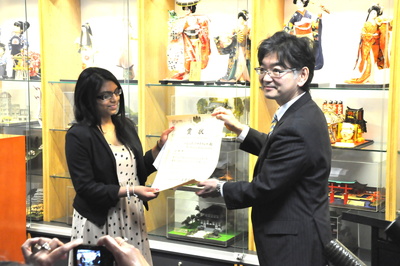
Hashela (left) receiving the certificate and present from Mr. Sobashima
The Poetry for Peace Contest invited the world to hear the living testimonies of the atomic bomb survivors (appointed by the Japanese government as “Special Communicator for a World without Nuclear”) and respond to their stories in verse. People were also encouraged to “like” the poems that most touched them. Best three were chosen among the many “liked” poems submitted. The most interesting thing about this contest is that it has brought poets from all over the world together for the sake of peace.
Three winners were announced on 25 October 2011 at a ceremony at the United Nations Headquarters in New York. First place went to a resident in the Netherlands, Hashela’s “How can I forget?” got second place and third place went to a British resident.
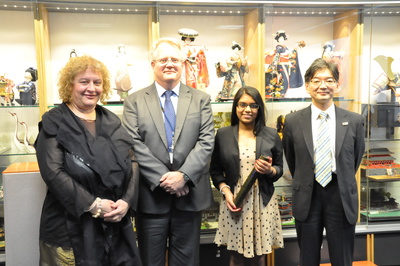
The English literature teacher at Keilor Downs College, Kelly Mihai. The Principal, Stuart Andrews, Hashela and Mr. Sobashima
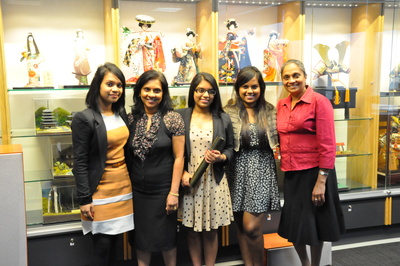
Hashela and her Sri Lankan family members
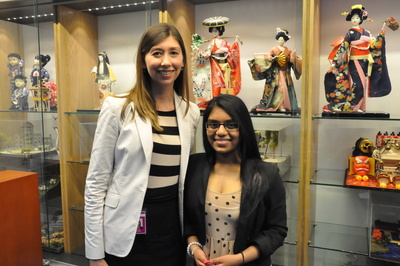
Jennifer Swanton used to be Hashela’s Japanese teacher from her primary school and now a Japanese language advisor for the Department of Education and Early Childhood Development Victoria. She rushed to the awards ceremony after learning the news
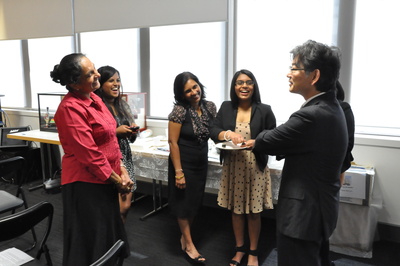
Hashela’s family and Mr. Sobashima having a chat
Mr. Sobashima, the Consul-General in Melbourne mentioned in his speech that Japan is the only country suffered from the atomic bombings therefore shows strong will to continue to eliminate nuclear weapons.
Japan’s proposal on the destruction of nuclear weapon was adopted in the UN General Assembly on 2 December. Mr. Sobashima was involved in writing up the first draft himself in 1994. He wanted Hashela to be proud of her award-winning poem as it helps nuclear disarmament, as well as the spread of the message of world peace.
According to Hashela, it was a high school teacher who knows her well suggested the poetry-writing lover enter the contest.
Reading the testimonies of the atomic bomb survivors on the UN website, Hashela expressed her grief and sorrow through words.
“The days before the atomic bombings were completely ordinary yet everything changed since then,” the teenager explained.
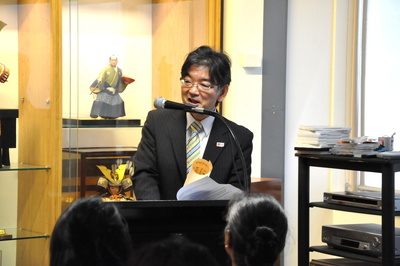
Mr. Sobashima making a speech
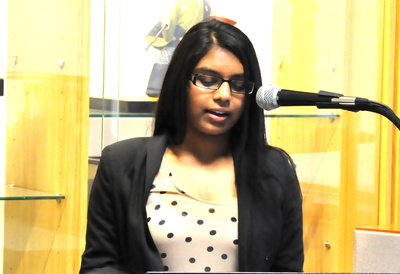
Hashela reciting her award-winning “How can I forget?”
“I am so excited to have received an award,” said Hashela, who wants to be a journalist in the future.
How can I forget?
How can I forget
That exploding sound
Which stole my family from me
Leaving me, with no one around?
How can I forget
Looking into mother’s eyes?
Desperately, she called for my help
Hopelessly, I watched her die
How can I forget
The burnt bodies on the floor?
Whether my family was amongst them
Even today, I am unsure
How can I forget
Those piercing screams
Which haunt me daily
When appearing in my dreams?
How can I forget
How some are so unkind?
Peace on Earth is something
We urgently need to find
— Hashela Kumarawansa
For further detail of the Poetry for Peace Contest, please visit:
http://www.un.org/disarmament/special/poetryforpeace/




